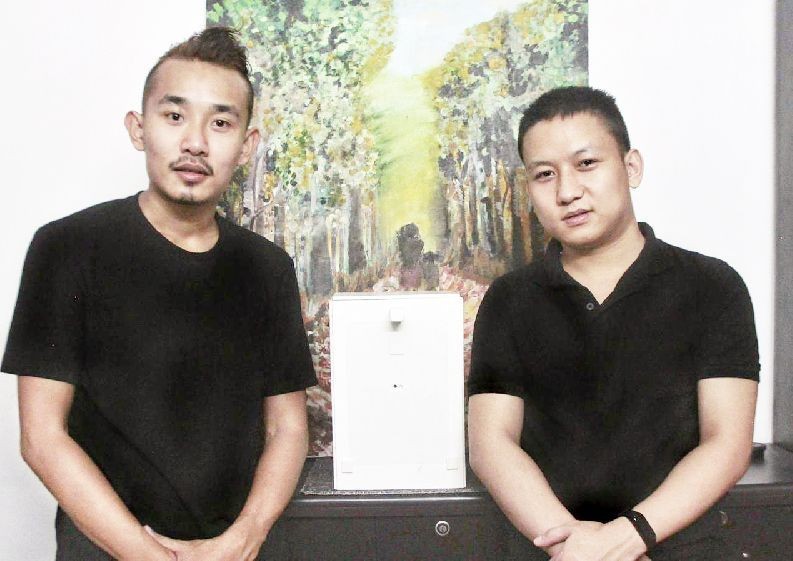Kesosilie Kennao (left) and Mhaleu Metha (right) with their sensor based hand sanitizer dispenser.

Morung Express News
Kohima | June 11
Two young Nagas in Delhi have developed a zero-touch hand sanitizer dispenser- an auto-sensing machine that sprays alcohol-based sanitiser when the user places their hand under the dispenser.
Powered by a 9-volt replaceable battery, the machine can be used for at least three weeks on a single charge and has an infrared proximity sensor along with the capacity to hold 3 litres of hand sanitiser.
Behind this creative innovation are Mhaleu Metha from Sovima village and Kesosilie Kennao from Medziphema town who are currently based in Delhi. Both from humanities background, the self-taught inventors developed the machine with the primary purpose of serving frontline workers.
Metha runs a restaurant in South Delhi while Kennao is a professional photographer. But when their jobs were put on hold in the midst of a pandemic and countrywide lockdown, the two youngsters decided to challenge themselves and create something resourceful. Both tech enthusiasts and having worked and experimented on building models, toys and projects for years, the duo challenged themselves to build an automatic hand sanitising machine.
Within eight hours, they completed their innovation which they refer to as a sensor based hand sanitizer dispenser.
"We are out of jobs. So, we just gave ourselves a challenge to try and thought we'll share this idea with friends. We just gave a try and it was very successful," said Metha.
Upon sharing their innovation with friends, their work soon went viral in social mediums receiving positive and encouraging response.
"We were really into coming up with something unique and help our own people and this how we started," said 26 year old Kennao. While a lot of citizens continue to criticise and point fingers at the government, he advocated that in such critical times, one should be lending a helping hand in any way possible.
Acknowledging the efforts of frontline workers in Nagaland, the duo hoped that the machine will help them.
"There is zero contact. You don't have to touch the machine for the whole day. It has the capacity to last for 3-4 weeks. It's a small battery but the power consumption is very low," they explained.
While the two agreed that there will be other companies that can develop far superior models, another core intention in developing their work is to motivate young Nagas to come up with more innovations and prove that Nagas too can do it.
"The world is totally going to change after this pandemic, especially our lifestyles. And sanitizers are going to be a huge part of our daily lives," Metha said.
While financial assistance continues to be a challenge for the two young innovators, with more support they wish to produce more of their work and distribute it for free to frontline workers in Nagaland.
"Talking about technology in Nagaland we all agree that we are far behind other States in India but isn’t it time to ask why and do something about it? I refuse to believe that we are lacking capability. I don't think our people lack education or ideas. We lack resources, and the will and encouragement. Due to the lack of resources many youngsters are unable to experiment their ideas," remarked Metha.
While there are thousands of engineering and medical students in Nagaland with degrees from some of the most prestigious institutions in the country, the duo rues over the fact that Nagaland sees very few innovations.
"It is about time that we put our knowledge in service of the people, no matter how small it may be. The most glaring threat before us today is the COVID-19 pandemic. And now more than ever we must do everything in our capacity to render our service," they maintained.
The two are currently engaged in building a 3D model which is expected to be completed within a week’s time.






